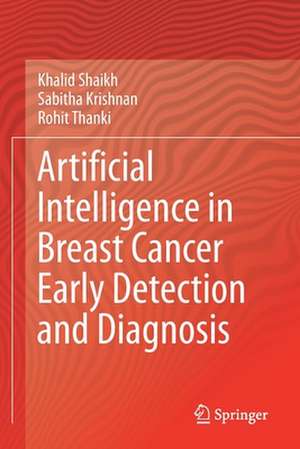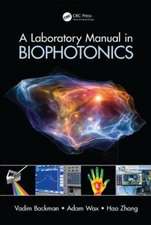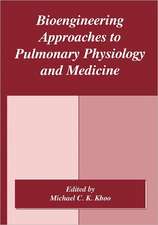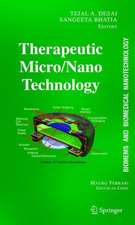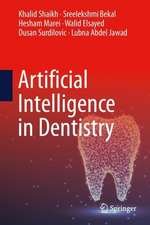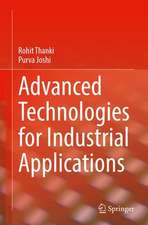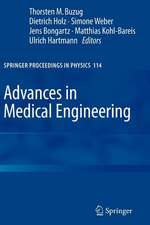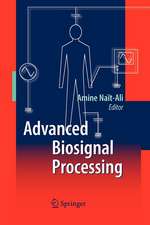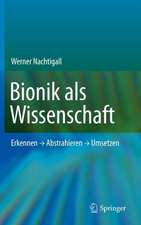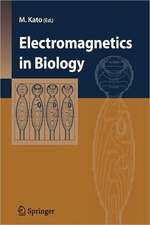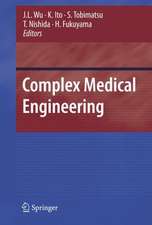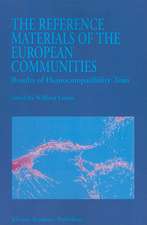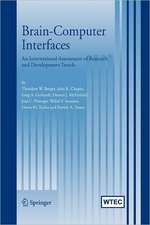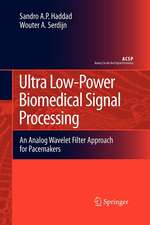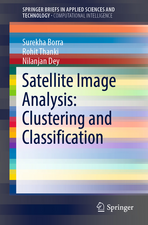Artificial Intelligence in Breast Cancer Early Detection and Diagnosis
Autor Khalid Shaikh, Sabitha Krishnan, Rohit Thankien Limba Engleză Paperback – 5 dec 2021
- Discusses various existing screening methods for breast cancer
- Presents deep information on artificial intelligence-based screening methods
- Discusses cancer treatment based on geographical differences and cultural characteristics
| Toate formatele și edițiile | Preț | Express |
|---|---|---|
| Paperback (1) | 1021.49 lei 43-57 zile | |
| Springer International Publishing – 5 dec 2021 | 1021.49 lei 43-57 zile | |
| Hardback (1) | 1028.41 lei 43-57 zile | |
| Springer International Publishing – 5 dec 2020 | 1028.41 lei 43-57 zile |
Preț: 1021.49 lei
Preț vechi: 1075.25 lei
-5% Nou
Puncte Express: 1532
Preț estimativ în valută:
195.46€ • 204.62$ • 161.73£
195.46€ • 204.62$ • 161.73£
Carte tipărită la comandă
Livrare economică 07-21 aprilie
Preluare comenzi: 021 569.72.76
Specificații
ISBN-13: 9783030592103
ISBN-10: 3030592103
Ilustrații: XII, 107 p. 23 illus., 9 illus. in color.
Dimensiuni: 155 x 235 mm
Greutate: 0.18 kg
Ediția:1st ed. 2021
Editura: Springer International Publishing
Colecția Springer
Locul publicării:Cham, Switzerland
ISBN-10: 3030592103
Ilustrații: XII, 107 p. 23 illus., 9 illus. in color.
Dimensiuni: 155 x 235 mm
Greutate: 0.18 kg
Ediția:1st ed. 2021
Editura: Springer International Publishing
Colecția Springer
Locul publicării:Cham, Switzerland
Cuprins
An Introduction to Breast Cancer Diagnosis, Prognosis, and Artificial Intelligence.- Breast Cancer and Its Types.- Artificial Intelligence.- Breast Cancer Screening Using AI Methods.- Case Study for Screening of Breast Cancer.
Notă biografică
Khalid Shaikh is a serial entrepreneur, a technocrat, and a business strategist. He is the founder and CEO of Prognica Labs, an Artificial Intelligence powered health-tech startup, and Affaan Technologies, an AI Consulting and Development Company. He is a computer engineer and has a solid record of more than 20 years of high level performance in the healthcare and finance industries. In addition to his professional commitments, he also gives back to the aspiring entrepreneur community by serving as an advisor and mentor.
Sabitha Krishnan is an artificial intelligence specialist with Prognica Labs, where she works on innovative solutions for the diagnosis of deadly human diseases. Her research background includes experience implementing machine learning in detecting eye disorders and tumor diagnosis in the brain, breast, and skin, and ultrasound for detection of abnormalities in the abdomen. Her current research interest lies in thecreation of unsupervised deep neural networks for cancer diagnosis. She holds a Master of Engineering in Biomedical Engineering and a Bachelor of Engineering in Computer Science Engineering from Anna University.
Dr. Rohit M. Thanki received his PhD in electronics and communication engineering from C.U. Shah University, an ME in communication engineering from G.H. Patel College of Engineering and Technology, and a BE in electronics and communication engineering from Atmiya Institute of Technology and Science, India. His primary areas of research are artificial intelligence, computer vision, digital watermarking, medical image analysis, multimedia security, biometrics, and compressive sensing. He has published 11 books with Springer and one with CRC Press, and has contributed 13 book chapters in edited books published by Elsevier, Springer, CRC Press, and IGI Global. He has published over 20 research articles in refereed and indexed international journals, and is a reviewer for journals such as ACM Transactions on Multimedia Computing, Communications and Applications, IEEE Access, IEEE Consumer Electronics Magazine, IET Image Processing, IET Biometrics, Soft Computing, Imaging Science Journal, Signal Processing: Image Communication, and Computers & Electrical Engineering.
Sabitha Krishnan is an artificial intelligence specialist with Prognica Labs, where she works on innovative solutions for the diagnosis of deadly human diseases. Her research background includes experience implementing machine learning in detecting eye disorders and tumor diagnosis in the brain, breast, and skin, and ultrasound for detection of abnormalities in the abdomen. Her current research interest lies in thecreation of unsupervised deep neural networks for cancer diagnosis. She holds a Master of Engineering in Biomedical Engineering and a Bachelor of Engineering in Computer Science Engineering from Anna University.
Dr. Rohit M. Thanki received his PhD in electronics and communication engineering from C.U. Shah University, an ME in communication engineering from G.H. Patel College of Engineering and Technology, and a BE in electronics and communication engineering from Atmiya Institute of Technology and Science, India. His primary areas of research are artificial intelligence, computer vision, digital watermarking, medical image analysis, multimedia security, biometrics, and compressive sensing. He has published 11 books with Springer and one with CRC Press, and has contributed 13 book chapters in edited books published by Elsevier, Springer, CRC Press, and IGI Global. He has published over 20 research articles in refereed and indexed international journals, and is a reviewer for journals such as ACM Transactions on Multimedia Computing, Communications and Applications, IEEE Access, IEEE Consumer Electronics Magazine, IET Image Processing, IET Biometrics, Soft Computing, Imaging Science Journal, Signal Processing: Image Communication, and Computers & Electrical Engineering.
Textul de pe ultima copertă
This book provides an introduction to next generation smart screening technology for medical image analysis that combines artificial intelligence (AI) techniques with digital screening to develop innovative methods for detecting breast cancer. The authors begin with a discussion of breast cancer, its characteristics and symptoms, and the importance of early screening.They then provide insight on the role of artificial intelligence in global healthcare, screening methods for breast cancer using mammogram, ultrasound, and thermogram images, and the potential benefits of using AI-based systems for clinical screening to more accurately detect, diagnose, and treat breast cancer.
- Discusses various existing screening methods for breast cancer
- Presents deep information on artificial intelligence-based screening methods
- Discusses cancer treatment based on geographical differences and cultural characteristics
Caracteristici
Discusses various existing screening methods for breast cancer Presents deep information on artificial intelligence-based screening methods Discusses cancer treatment based on geographical differences and cultural characteristics
